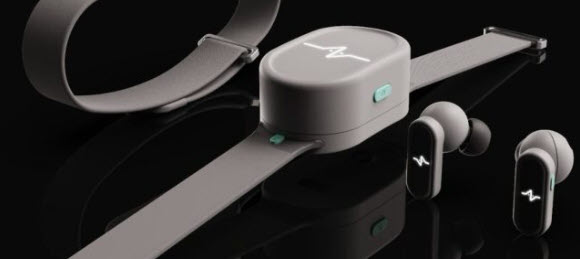For stroke survivors worldwide, persistent upper limb impairment is a significant and often devastating consequence. While intensive, repetitive therapy is crucial for activating neuroplasticity and improving motor function, access to high-intensity, round-the-clock rehab is often unfeasible in traditional clinical settings. We know that this gap between formal therapy and the need for continual muscle engagement can lead to suboptimal recovery, particularly for those with moderate-to-severe impairment.
Addressing this challenge, KnitRegen, a UK-based MedTech startup, is developing a novel wearable smart textile system designed to facilitate constant, functional rehabilitation. Founded as a spin-out from the Royal College of Art, KnitRegen leverages a unique combination of technical textile design, neuroscience, and material science. In collab with researchers and organisations like the University of Central Lancashire and the Centre for Process Innovation, the company has developed a prototype wristband device, dubbed the ‘PowerBead’. This device delivers targeted muscle stimulation through integrated smart textile components, moving the technology from a bulky, backpack-sized system to a discreet, user-friendly wearable. The innovation is based on evidence that delivering specific, timed muscle stimulation can improve strength and mobility, especially when paired with an auditory cue.
The KnitRegen system aims to provide continual muscle stimulation outside of supervised therapy sessions, a critical factor for driving neuroplasticity. The mechanism is thought to involve stimulating the recruitment of the reticulospinal tract (RST), offering a potential pathway for recovery for survivors with severe damage to the corticospinal tract (CST). By enabling consistent muscle stimulation, the device increases the total amount of therapeutic engagement, which is linked to improved recovery outcomes, particularly for survivors with moderate-to-severe upper limb impairments (a patient group that often has limited treatment options).
The embedded smart textile components provide state-of-the-art muscle stimulation, specifically activating muscles in the hand and arms to restore movement and strength. Developed in co-design with stroke survivors, the wristband is designed for comfort and ease of use, addressing a common usability challenge with existing functional electrical stimulation (FES) systems. It’s also designed to be discreet, resembling a normal accessory rather than an obvious medical device.
Initial studies involving 16 stroke survivors have shown that the PowerBead can effectively activate hand and arm muscles. Further pilot studies on healthy volunteers have been conducted to optimise the wearable’s comfort and effectiveness. The company plans to conduct longer-term trials to measure the device’s effect on strength and movement over time and is working towards gaining regulatory approval. KnitRegen’s data collection could also contribute valuable information on continual rehabilitation methods for other Internet of Things (IoT) devices in the future.
The KnitRegen smart textile system represents a significant step forward in making intensive, evidence-based rehab accessible for stroke survivors at home but like the VTS Glove below, it’s not on the market yet. The PowerBead is still undergoing further development and clinical testing, but it seems to offer a potential breakthrough for millions of stroke survivors worldwide who are seeking to regain movement and independence…



